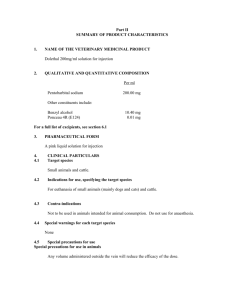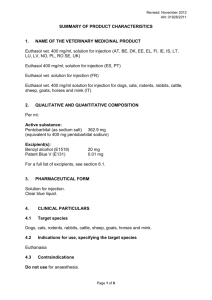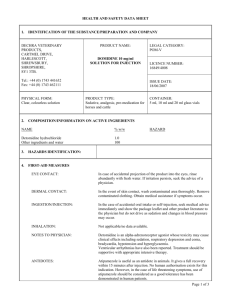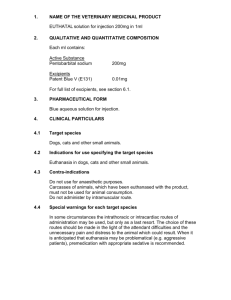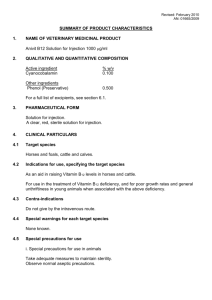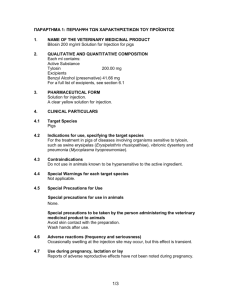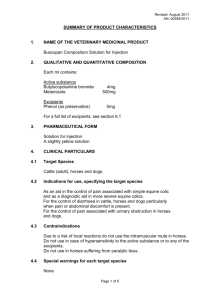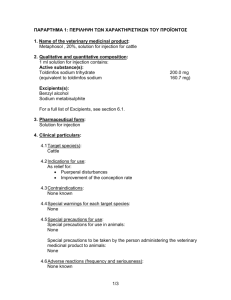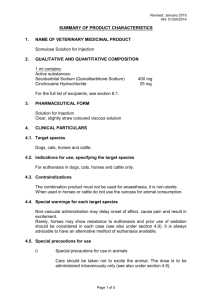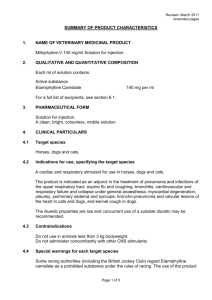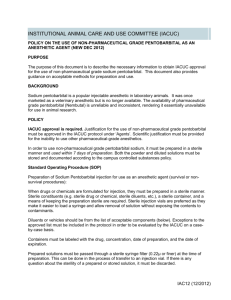Revised: July 2014 AN: 00139/2014 SUMMARY OF PRODUCT
advertisement
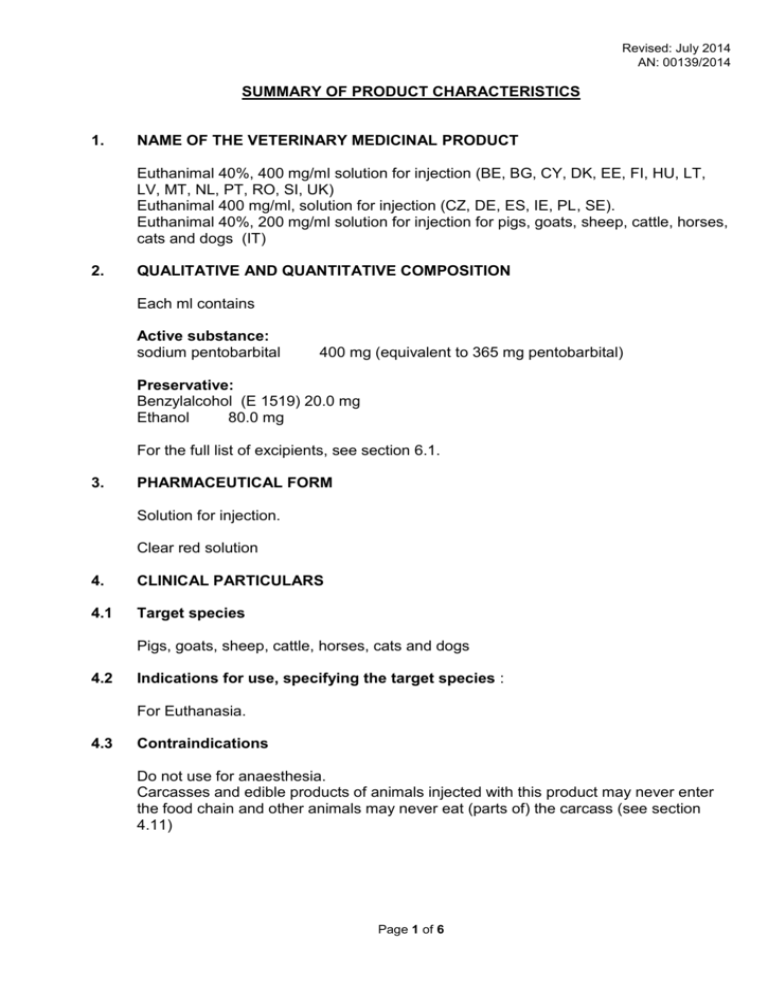
Revised: July 2014 AN: 00139/2014 SUMMARY OF PRODUCT CHARACTERISTICS 1. NAME OF THE VETERINARY MEDICINAL PRODUCT Euthanimal 40%, 400 mg/ml solution for injection (BE, BG, CY, DK, EE, FI, HU, LT, LV, MT, NL, PT, RO, SI, UK) Euthanimal 400 mg/ml, solution for injection (CZ, DE, ES, IE, PL, SE). Euthanimal 40%, 200 mg/ml solution for injection for pigs, goats, sheep, cattle, horses, cats and dogs (IT) 2. QUALITATIVE AND QUANTITATIVE COMPOSITION Each ml contains Active substance: sodium pentobarbital 400 mg (equivalent to 365 mg pentobarbital) Preservative: Benzylalcohol (E 1519) 20.0 mg Ethanol 80.0 mg For the full list of excipients, see section 6.1. 3. PHARMACEUTICAL FORM Solution for injection. Clear red solution 4. CLINICAL PARTICULARS 4.1 Target species Pigs, goats, sheep, cattle, horses, cats and dogs 4.2 Indications for use, specifying the target species : For Euthanasia. 4.3 Contraindications Do not use for anaesthesia. Carcasses and edible products of animals injected with this product may never enter the food chain and other animals may never eat (parts of) the carcass (see section 4.11) Page 1 of 6 Revised: July 2014 AN: 00139/2014 4.4 Special warnings for each target species Intravenous injection of pentobarbital has the ability to cause induction excitement in several species of animal and adequate sedation should be applied if deemed necessary by the veterinary surgeon. Measures must be taken to avoid perivascular administration (e.g. by using intravenous catheter). Check regularly, up to about 10 minutes post-administration, if live signs return (respiration, heartbeat, corneal reflex). In clinical trials it has been established that this might occur. If such live signs return, it is advised to repeat the administration using between 0.5 and 1 times the prescribed dose. Avoid use in animals weighing less than 20kg due to the highly concentrated nature of the product and increased risk of pain and irritation if administered perivascularly. To reduce the risk of induction excitement, euthanasia should be performed in a quiet area. Particularly in horses and cattle, the veterinary surgeon should consider premedication with an appropriate sedative to produce profound sedation before euthanasia and an alternative method of euthanasia is recommended to be available should it become necessary. 4.5 Special precautions for use i. Special precautions for use in animals None. ii. Special precautions to be taken by the person administering the veterinary medicinal product to animals Pentobarbital is a potent hypnotic and a sedative, and thus potentially toxic in man. It can be adsorbed systemically through the skin and if swallowed. Particular care should be taken to avoid accidental ingestion and self-injection Systemic uptake (including absorption via skin or eye) of pentobarbital causes sedation, sleep induction and respiratory depression. Moreover, this product may be irritating to the eye and can cause irritation to the skin as well as hypersensitivity reactions (due to the presence of pentobarbital and benzyl alcohol). Embryotoxic effects cannot be excluded. Avoid direct contact with the skin and eyes, including hand-to-eye contact. Avoid accidental self-injection or accidental injection of a second professional when administering the product. People with known hypersensitivity to pentobarbital should avoid contact with the veterinary medicinal product Page 2 of 6 Revised: July 2014 AN: 00139/2014 Handle the product with utmost care, especially women of childbearing potential. Wear protective gloves. This medicine should only be administered by veterinarians and should only be used in the presence of another professional that can assist in case of accidental exposure. Instruct the professional if not a medical professional about the risks of the product. Accidental spillage on the skin or in the eye must be washed off immediately with plenty of water; If there has been serious skin or eye contact or in case of accidental self-injection, seek medical advice immediately and show the package leaflet or the label to the physician. In case of accidental ingestion, wash out mouth and obtain medical attention immediately. But DO NOT DRIVE as sedation may occur. After administration of this product, collapse will occur within 10 seconds. In case the animal is standing at time of administration, care should be taken by the person administering the veterinary medicinal product and any other persons present to keep a certain distance from the animal to avoid injury This product is flammable, keep away from sources of ignition. Do not smoke. Information for the health professional in case of exposure: Emergency measures should be directed toward maintenance of respiration and cardiac function. In severe intoxication measures to enhance elimination of absorbed barbiturate may be necessary. The concentration of pentobarbital in the product is such that the accidental injection or ingestion of quantities as small as 1ml in human adults can have serious CNS effects. A dose of pentobarbital sodium of 1g (equivalent to 2.5ml of product) has been reported to be fatal in humans. Treatment should be supportive with appropriate intensive therapy and maintenance of respiration. 4.6 Adverse reactions (frequency and seriousness) Death may be delayed if the injection is administered perivascularly or into organs/tissues with low capacity for absorption. Barbiturates can be irritating when administered perivascularly. Common: Vocalisation Muscle twitching Rare: Excitation Leg movements Defecation and urine loss Gasping (in cattle), mostly due to underdosing Very rare: Convulsions Contraction of the diaphragm Vomiting One or few gasping respiration occur after cardiac arrest Page 3 of 6 Revised: July 2014 AN: 00139/2014 4.7 Use during pregnancy, lactation or lay No specific information is available. The use of this product in pregnant animals is left to the judgement of the veterinarian. 4.8 Interaction with other medicinal products and other forms of interaction CNS depressants (narcotics, phenothiazines, antihistamines, etc.) may increase the effect of pentobarbital. 4.9 Amounts to be administered and administration route Cattle, horses, pigs, goats, sheep, cats and dogs: 100 mg/kg (corresponding to 0.25 ml/kg) through quick intravenous injection. For larger animals, the use of a pre-inserted intravenous catheter is advocated If cardiac arrest is not established after 2 minutes, a second dose needs to be administered, preferably via fast intravenous injection or if this is not feasible, via intracardiac injection; intra-cardiac injection is only acceptable after prior deep sedation or anaesthesia. As the vial cannot be punctured more than 20 times, the user should choose the most appropriate vial size. 4.10 Overdose (symptoms, emergency procedures, antidotes), if necessary In the event of accidental administration to an animal not presented for euthanasia, measures such as artificial respiration, administration of oxygen and the use of analeptics are appropriate. In view of the activity of this product, double dosage is discouraged, as this will not result in a faster or better euthanasia. 4.11 Withdrawal period Not applicable Appropriate measures need to be taken to assure that carcasses and edible products of animals injected with this product do not enter the food chain, and are not used for human consumption. Other animals may never eat (parts of) the carcass, as they might be exposed to a lethal dose of pentobarbital. 5. PHARMACOLOGICAL PROPERTIES Pharmacotherapeutic group: Barbiturates intended for euthanasia. ATCvet code: QN51AA01. Page 4 of 6 Revised: July 2014 AN: 00139/2014 5.1 Pharmacodynamic properties Pentobarbital is a short-acting sedative and hypnotic. It causes depression of the central nervous system by GABA receptor modulation, imitating the action of Gammaaminobutyric acid. Barbiturates suppress in particular the reticular activating system (RAS) in the brain, which normally ensures alertness. The immediate effect is the loss of consciousness followed by deep anaesthesia followed by, at high rates, rapid depression of the respiratory centre. Breathing stops and is quickly followed by cardiac arrest and rapid death. 5.2 Pharmacokinetic particulars After intravenous administration fast distribution over the tissues will occur. Pentobarbital is mainly eliminated through the liver by biotransformation, particularly by the Cytochrome P450 system, as well as by excretion in the kidneys and redistribution. In pigs redistribution in fatty tissue might cause reduced plasma concentrations and prolonged action. Barbiturates may diffuse through the placenta in foetal tissue, and traces of barbiturates may be present in the breast milk. 6. PHARMACEUTICAL PARTICULARS 6.1 List of excipients Ethanol 96% Propylene glycol Benzyl alcohol (E1519) Ponceau 4R (E124) Water for injection 6.2 Incompatibilities In the absence of incompatibility studies, this veterinary medicinal product must not be mixed with other veterinary medicinal products. 6.3 Shelf life Shelf life of the veterinary medicinal product as packaged for sale: 3 years Shelf life after first opening the immediate packaging: 28 days. 6.4 Special precautions for storage This medicinal product does not require any special storage conditions. Page 5 of 6 Revised: July 2014 AN: 00139/2014 6.5 Nature and composition of immediate packaging 1 vials of 100 ml or 1 vial of 250 ml, type II glass injection vial with a bromobutylrubber stopper and aluminium cap in carton box 12 vials of 100 ml or 6 vials of 250 ml, type II glass injection vial with a bromobutylrubber stopper and aluminium cap in polystyrene box. Not all pack sizes may be marketed. 6.6 Special precautions for the disposal of unused veterinary medicinal product or waste materials derived from the use of such products This medicinal product is dangerous to humans and animals. Dispose of any unused product and empty containers in accordance with guidance from your local waste regulation authority 7. MARKETING AUTHORISATION HOLDER Alfasan Nederland BV Kuipersweg 9, Woerden The Netherlands 8. MARKETING AUTHORISATION NUMBER Vm 36408/4002 9. DATE OF FIRST AUTHORISATION Date: 02 October 2013 10. DATE OF REVISION OF THE TEXT Date: July 2014 PROHIBITION OF SALE, SUPPLY AND/OR USE Medicine for the exclusive use of the veterinary surgeon. Not for sale to the public. The administration and custody of the medicine should only be carried out by the veterinary surgeon. 06 August 2014 Page 6 of 6
